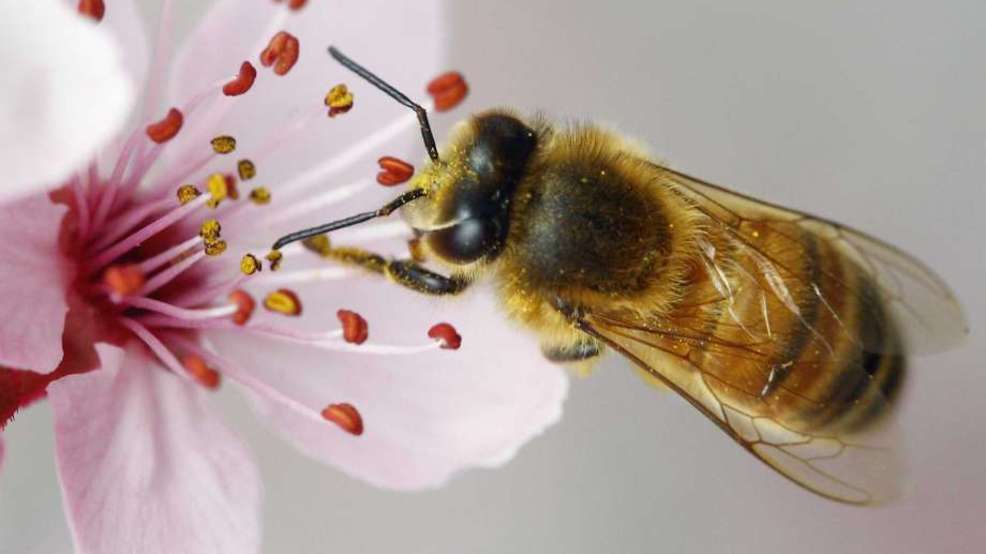Pollinator Connection: Ways you can bee engaged

BY KRISTINA LEFEVER…
I love the “Engage Ashland” idea recently put forward by the city. Yes, Ashland (and other places) are so much improved when residents engage and do things. So, this column is a riff on that idea, offering several more ways to “get engaged.”
First, I’d like to thank Nina Egert for her investigations and writings about the use of pesticides for mosquitoes, weeds, and more, in several of her recent Act Locally columns in the Tidings. The topic of pesticides is definitely engaging a lot of folks, especially after several recent news stories.
Did you hear about the study that confirmed that glyphosate, the primary ingredient in the herbicide Roundup, does harm honey bees? Proponents of Roundup have long assured us that bees and other creatures cannot be harmed by Roundup because non-plant species do not have the same biology as plants, because the “pathway” in plants that glyphosate targets (the shikimate pathway) is missing. And that is almost true.
But, as the team led by Dr. Nancy Moran discovered, beneficial microbes living in honey bee stomachs and intestines contain the shikamate pathway! So when a bee ingests or is exposed to field levels of Roundup, its immune system becomes compromised, making it much more susceptible to pathogens — and pesticides, too. So even if a bee is not killed outright, its lifespan and progeny could be affected.
And it’s not just bees. Hopefully by now you’ve heard that, even following appeal, the landmark verdict against Bayer (Monsanto) was upheld, confirming that their flagship product, Roundup, was indeed a cause of Mr. Johnson’s cancer. And there are almost 9,000 similar cases on the docket against the chemical company.
Let’s bee engaged — let’s ask: Why is Roundup still on store shelves, and why are people still using it and other products that contain glyphosate?
I recently engaged with both Ashland’s City Council and the Parks and Recreation Commission, and also KSKQ’s Honey Culture radio, on another issue that everyone needs to know about: Section 9101 in the House version of the proposed Farm Bill. If this provision remains in the final Farm Bill, it will:
1. Preempt cities and counties from adopting pesticide regulations on their own property; and
2. Reverse the policies of cities (like Ashland) that already have such a policy in place!
Here’s the language that needs to be removed:
“Section 24(a) of the Federal Insecticide, Fungicide, and Rodenticide Act … is amended by striking ‘A State may’ and inserting ‘A State, but not a political subdivision of a State, may.’”
Want to get engaged on this important issue? Let’s tell our federal representatives that taking away local control on an issue critical to the health of people, especially children, pollinators, fish, birds, wildlife, and more, is not acceptable!
Non Toxic Neighborhoods (www.facebook.com/nontoxicneighborhoods) is doing great work around Section 9101 and has a letter that everyone can use. Visit their website, download the letter, and edit it to add your name. Old-fashioned letters in stamped envelopes, mailed to the four addressees and the three cc’s, are preferred for this important campaign. And please invite friends and family in other areas of the country to engage.
Non Toxic Neighborhoods (NTN) and their engagement with dozens of cities rethinking landscape maintenance practices was the inspiration behind Non Toxic Rogue Valley (NTRV), an initiative of Beyond Toxics and Pollinator Project Rogue Valley.
In fact, the city of Talent, following a study session with NTN and NTRV and engaged city leaders and citizens, is currently working on an IPM (Integrated Pest Management) policy that will relegate the use of pesticides (and chemical fertilizers!) on city and park property to emergency situations only! However, unless the amendment above is removed from the final Farm Bill, Talent will not be able to implement their IPM.
(Thankfully, Ashland, was way ahead of the curve and ended the use of toxic synthetic pesticides about 8 years ago, except in the north median on Highway 99, the golf course, and ball field warning tracks. Again, this policy could be rescinded if the Farm Bill’s Section 9101 passes.)
I’d like to thank Lin Bernhardt of KSKQ’s Animal Matters for interviewing me on her show recently to talk about pollinators. It was a fun engagement, and led to a second interview with Cindy Harper of Talent to share our concerns about pets’ exposures to pesticides, which will air soon. Stay tuned!
Finally, a fun and educational engagement is Jackson County Master Gardener Association’s Winter Dreams/Summer Gardens symposium on Saturday, Nov. 3, at the RCC/SOU Higher Education Center in Medford (for details, go to bit.ly/2RxB2r5). It’s a really great opportunity to learn about any and all topics related to gardening. Hope to see you there!
—Kristina Lefever is a member of Pollinator Project Rogue Valley, Bee City USA Ashland and the Jackson County Master Gardeners Association. The Pollinator Connection appears quarterly.
